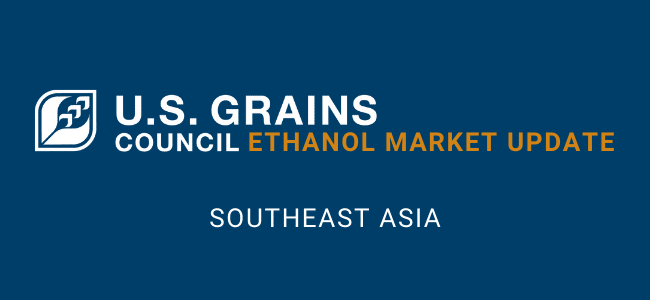This is the first in a recurring series of articles featuring outlooks for specific markets in which the U.S. Grains Council works.
Ethanol is increasingly capturing the interest of buyers and policymakers across Southeast Asia and Oceania (SEA) amid growing environmental awareness. The U.S. Grains Council (USGC) sees Indonesia, Vietnam, the Philippines and Malaysia as high-opportunity markets where focused development programs can help unlock value for expanding global ethanol use.
The Council’s SEA office has compiled a market research document that reviews ethanol’s market potential, market development efforts to date, the current market situation and what the future may hold in the region. A preview of that information can be found below, with a link to the full document at the end.
Indonesia
Indonesia is an archipelagic country of 275 million people and Southeast Asia’s largest economy. The country consumes close to 10 billion gallons of gasoline per year and could be primed to surpass 11 billion gallons annually by 2025 on the back of the global economic recovery. The Council’s current priority in Indonesia is to see an increase in the country’s blend rate to nearly 10 percent in addition to advocating for a pilot program in the East Java region.
Vietnam
Vietnam is another case of immense potential for expanded ethanol use. Southeast Asia’s fastest growing economy consumes close to three billion gallons of gasoline annually, with demand expected to grow 16 percent over the next five years. Vietnam’s gasoline consumption will grow and will carry with it a need to reduce fuel costs for its growing middle class and meet commitments to emissions reduction. The Council has worked in recent years to demonstrate the value of reducing tariffs on fuel ethanol in the market. Moreover, the Council strengthened its relationship with key regulators after signing a memorandum of understanding (MOU) with Vietnam’s Ministry of Industry and Trade (MOIT) to establish a close partnership in the field of ethanol policy through technical assistance.
“Vietnam has proven itself as a willing and able trade partner. We maintain a high level of cooperation on multiple levels to achieve mutually beneficial trade and environmental goals,” said Kent Yeo, USGC regional ethanol consultant in Southeast Asia.
The Philippines
The Philippines, Southeast Asia’s second-largest country by population, consumes over 1.5 billion gallons of gasoline per year and blends at 10 percent. The Council’s work there is a demonstration of how the Philippines can meet its higher blend goals by highlighting the environmental policy and demonstrating value to the local industry.
Malaysia
Malaysia’s gasoline consumption before the pandemic was growing at three percent per year, and total consumption is forecast to surpass five billion gallons per year by 2024. Despite being a mature gasoline market in Southeast Asia, use and knowledge of fuel ethanol is limited, providing the Council an opportunity to offer information on and assistance with the commercial and environmental benefits of transitioning to using ethanol.
With travel restrictions loosening across Southeast Asia for the first time since the start of the COVID-19 pandemic, the Council’s regional team is preparing to visit key ethanol markets in the coming months to further implement and execute market development activities.
“We have assembled a strong team in Southeast Asia to develop the market for ethanol in the region. With new faces alongside familiar Council teammates, we are positioned to accelerate our policy efforts in key markets,” said Caleb Wurth, USGC Southeast Asia and Oceania regional director. “We are changing our targets to match opportunities in front of us. With our regional strategy, we hope to deliver long lasting, sustainable partnerships between USGC members and Southeast Asia and Oceania.”
About The U.S. Grains Council
The U.S. Grains Council develops export markets for U.S. barley, corn, sorghum and related products including distiller’s dried grains with solubles (DDGS) and ethanol. With full-time presence in 28 locations, the Council operates programs in more than 50 countries and the European Union. The Council believes exports are vital to global economic development and to U.S. agriculture’s profitability. Detailed information about the Council and its programs is online at www.grains.org.

